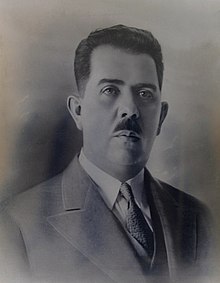Lázaro Cárdenas del Río
| Lázaro Cárdenas | |
|---|---|
 |
|
|
44th President of Mexico |
|
|
In office December 1, 1934 – November 30, 1940 |
|
| Preceded by | Abelardo L. Rodríguez |
| Succeeded by | Manuel Ávila Camacho |
| Governor of Michoacán | |
|
In office 1928–1932 |
|
| Preceded by | Luis Méndez |
| Succeeded by | Dámaso Cárdenas |
| Personal details | |
| Born |
Lázaro Cárdenas del Río May 21, 1895 Jiquilpan, Michoacán |
| Died | October 19, 1970 (aged 75) Mexico City, Mexico |
| Nationality | Mexican |
| Political party | Party of the Mexican Revolution |
| Spouse(s) | Amalia Solórzano |
| Children | Cuauhtémoc Cárdenas |
| Occupation | Statesman, General |
| Military service | |
| Allegiance |
|
| Service/branch | Mexican Army |
| Rank | General |
| Commands | Mexican Revolution |
Lázaro Cárdenas del Río (Spanish pronunciation: [ˈlasaɾo ˈkarðenas]; May 21, 1895 – October 19, 1970) was a general in the Mexican Revolution and a statesman who served as President of Mexico between 1934 and 1940. He is best known for nationalization of the oil industry in 1938 and the creation of Pemex, the government oil company.
Originally Cárdenas was the hand-picked candidate of former president Plutarco Elías Calles (1924–28), who founded the in 1929 and who remained the power behind the president. Cárdenas out-maneuvered Calles politically and forced the former president into exile, establishing Cárdenas' legitimacy and power in his own right. His administration overhauled agrarian reform, initiated by the Mexican Revolution, and created ejidos in the Mexican agricultural sector, which gave peasants access to land, but did not give individual titles to it. He granted asylum to exiles from the Spanish Civil War, and strengthened the educational system.
Porfirio Díaz of Oaxaca was the last president before Cárdenas not to come from the north. Cárdenas reorganized the party founded by Calles, creating the Partido de la Revolución Mexicana, with sectoral representation of workers via their unions, peasants via their peasant leagues, and the Mexican army. The incorporation of the army into the party structure was a deliberate move to diminish the power of the military and avert their traditional intervention in politics through coups d'état. Another important political achievement of Cárdenas was his complete surrender of power to his successor when his presidential term was completed in 1940. At the end of the term of his successor, Manuel Ávila Camacho, the party structure that Cárdenas had created was changed again, renamed the Institutional Revolutionary Party. The major revision of the party structure was to eliminate the army as a sector of the party. The party continued to dominate Mexican politics to the end of the twentieth century.
...
Wikipedia
